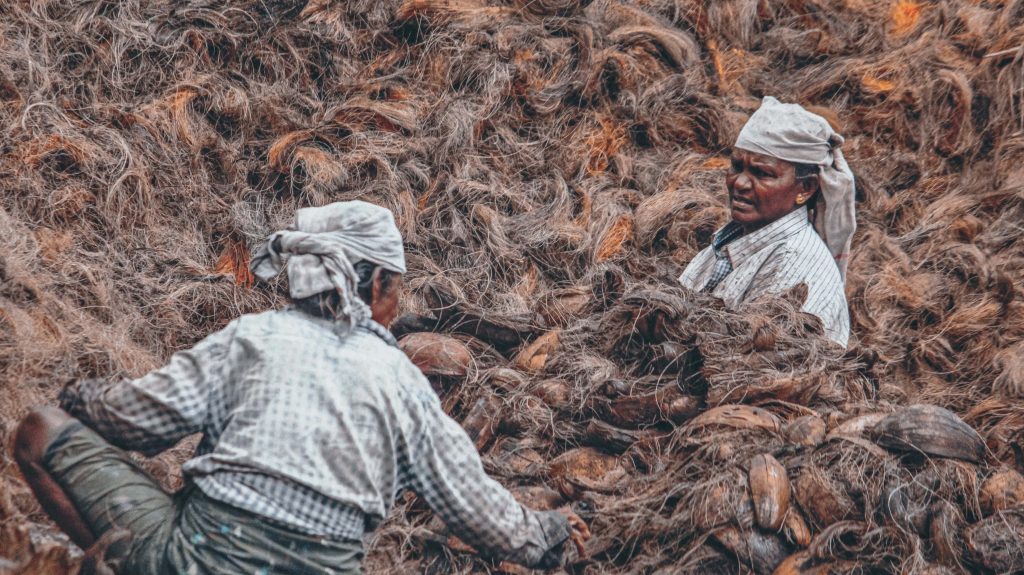
Imagine a land where heritage and artistry intertwine, creating extraordinary masterpieces that reflect a deep-rooted cultural tapestry. Welcome to India, a country renowned for its diverse and vibrant cultural heritage. Among the many treasures that adorn this rich tapestry, coir stands tall as a symbol of artistic mastery and sustainable living. In this article, we embark on a captivating exploration of the history and cultural significance of coir in India, unveiling its ancient origins and modern marvels. Together, let us uncover the timeless allure of coir and immerse ourselves in the vibrant world of coir products from Kerala, particularly the enchanting region of Alleppey.
Ancient Origins of Coir
Coir, derived from the fibrous husk of coconuts, boasts a history that stretches back through the annals of time. Its origins can be traced back to the ancient Vedic texts, where it found mention as an essential material for various purposes. The process of extracting coir fibers involves meticulous extraction, spinning, and weaving, revealing the intricate craftsmanship of the artisans. With its exceptional strength and durability, coir quickly became a prized material for ropes, mats, and various other utilitarian objects.
Ancient Indian civilizations recognized the immense value of coir and utilized it for a myriad of applications. From constructing fishing nets that sustained coastal communities to crafting sturdy ropes that facilitated trade and transportation, coir became an indispensable resource. Its natural resistance to water and durability made it an ideal material for seafaring vessels and as protection against the elements.
Cultural Significance of Coir
- Symbol of Sustainability: Coir holds immense cultural significance in India, embodying the ethos of sustainability and eco-friendliness. Its utilization in everyday life reflects a deep-rooted respect for nature and a commitment to preserving the environment. Coir, being a natural byproduct of the coconut industry, is renewable and biodegradable. The traditional wisdom of utilizing coir aligns with India’s cultural practices, emphasizing the importance of sustainable living and harmony with nature.
- Traditional and Festive Celebrations: Coir plays an integral role in traditional and festive celebrations across India, adding a touch of beauty and cultural significance. One notable example is the festival of Onam in Kerala, where intricately woven coir mats, known as “pookkalam,” adorn the thresholds of homes. These vibrant floral patterns were once created using dyed coir fibers instead of flowers in many parts of Alleppey, are a testament to the skill and creativity of coir artisans. Such traditions not only showcase the aesthetic appeal of coir but also connect communities to their cultural roots.
Craftsmanship of Coir Manufacturers from India
Kerala: The Hub of Coir Products Among the many regions in India renowned for coir craftsmanship, Kerala stands out as a hub of exceptional quality and artistry. Often referred to as the “Land of Coconuts,” Kerala boasts a centuries-old tradition of coir manufacturing. The backwaters of Alleppey, nestled in the heart of Kerala, have gained global recognition for producing some of the finest coir products in the world. The skilled coir manufacturers in this region have mastered the art of transforming coir fibers into a wide array of exquisite products, ranging from mats and carpets to baskets and intricately crafted handicrafts.
Technique and Expertise: Coir manufacturers in India employ a combination of traditional techniques passed down through generations and modern innovations to create their masterpieces. The process begins with the extraction of fibers from coconut husks, a meticulous task that requires skilled hands. These fibers are then carefully spun and woven into intricate patterns, showcasing the artisans’ expertise and attention to detail. The combination of traditional craftsmanship and contemporary design sensibilities results in coir products that are not only visually stunning but also durable and functional.
Modern Marvels: Coir Products from Kerala, Alleppey
Coir Mats and Carpets: The coir mats and carpets from Kerala, Alleppey, exemplify the versatility and durability of this remarkable material. Crafted with precision and adorned with vibrant colors, these mats add a touch of elegance to any space. Known for their resistance to water and dirt, coir mats are not only aesthetically pleasing but also practical, making them a popular choice for households, hotels, and commercial spaces.
Coir Handicrafts and Artifacts: The coir manufacturers in Kerala demonstrate their artistic prowess through a wide range of handicrafts and artifacts. These masterpieces, created with passion and skill, include intricately designed wall hangings, lampshades, baskets, and sculptures. Each piece reflects the rich cultural heritage of India, featuring traditional motifs and patterns. The intricate craftsmanship and attention to detail make these coir handicrafts coveted items for interior decoration and collectors alike.
FAQs:
1) Is coir a sustainable material?
Absolutely! Coir is derived from the husk of coconuts, making it an eco-friendly and renewable resource. Unlike synthetic materials, coir is biodegradable and does not contribute to environmental pollution. Its sustainable nature aligns with the growing global consciousness towards adopting eco-friendly alternatives.
2) What are the popular coir products from Kerala, Alleppey?
Kerala, Alleppey, is renowned for its coir door mats, coir carpets, Erosion Control Products such as Coir Logs & Coir Geotextiles, Coir Pith, wall hangings, lampshades, baskets, and sculptures. These products showcase the exceptional craftsmanship and artistic flair of the coir manufacturers in the region. Each piece is a testament to the rich cultural heritage and skilled craftsmanship that has been passed down through generations.
As we conclude this enlightening journey through the history and cultural significance of coir in India, we stand in awe of its timeless allure and remarkable craftsmanship. Coir continues to captivate the world with its eco-friendliness, durability, and versatility. Let us celebrate the ingenuity of coir manufacturers from India, particularly those hailing from Kerala, Alleppey, who have transformed this humble material into a symbol of cultural heritage and sustainable living. Through their skill and passion, they have woven a captivating tapestry that connects us to our roots and inspires us to embrace the beauty of traditional craftsmanship in a modern world.
